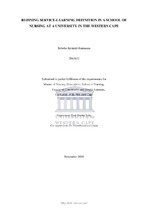Refining service-learning definition in a school of nursing at a university in the Western Cape
Abstract
Background: Service-learning links academic acquisition with community-based work within a partnership framework, which is underpinned by values such as respect, reciprocity, relevance and reflection. This pedagogy has its roots in the northern hemisphere, but has become popular with higher education institutions across the globe. According to Butin, service-learning became institutionalised in the USA after a critical mass of service-learning champions was reached in the 1990s. Hence, the majority of higher education institutions are now subscribing to the national organisation, Campus Compact, which is committed to broadening the footprint of service-learning in this sector.
Within the South African higher education sector, “service-learning” as a term became known in 1996. There is, however, wide-spread disagreement as to what is meant by “service-learning”, or exactly what it is meant to accomplish. As a result, education institutions must define it for themselves. A School of Nursing at a university in the Western Cape has defined service-learning during a baseline study that was conducted at the school and this particular definition is, therefore, regarded as a work in progress.
Aim: The aim of the study was to refine the preliminary service-learning definition developed during the baseline study by identifying the main concepts that should be included in the definition of service-learning for this School of Nursing.

